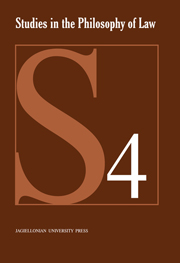Book contents
- Frontmatter
- Contents
- Preface
- Six Causes of the Dispute over Legal Bioethics
- Bioethics and Legal Philosophy
- The Outline of the Subject of Biojurisprudence
- Law and Biotechnology
- The Ethical Significance of Evolution
- Human Nature after Darwin
- The Notion of the Person in Bioethical Debates
- The Roots of Normativity. From Neuroscience to Legal Theory
- Why No One Should Ever Win the Nobel Prize: Neurolaw, Reward and Punishment
- Is There Anybody Who Really Wants to Live Forever? The Significance of Mortality
- The Slippery Slope Arguments Against the Legalization of Physician-Assisted Suicide
- Ethical Problems of Hematopoietic Stem Cells Transplantation
- Notes about the Authors
The Slippery Slope Arguments Against the Legalization of Physician-Assisted Suicide
Published online by Cambridge University Press: 05 September 2014
- Frontmatter
- Contents
- Preface
- Six Causes of the Dispute over Legal Bioethics
- Bioethics and Legal Philosophy
- The Outline of the Subject of Biojurisprudence
- Law and Biotechnology
- The Ethical Significance of Evolution
- Human Nature after Darwin
- The Notion of the Person in Bioethical Debates
- The Roots of Normativity. From Neuroscience to Legal Theory
- Why No One Should Ever Win the Nobel Prize: Neurolaw, Reward and Punishment
- Is There Anybody Who Really Wants to Live Forever? The Significance of Mortality
- The Slippery Slope Arguments Against the Legalization of Physician-Assisted Suicide
- Ethical Problems of Hematopoietic Stem Cells Transplantation
- Notes about the Authors
Summary
Introduction
The aim of this essay is to analyze the structure and formulate a preliminary evaluation of the soundness of one of the most commonly raised arguments against the legalization of physician-assisted suicide (hereafter PAS), namely, the so-called slippery slope argument (hereafter SSA). I will distinguish several versions of the argument and investigate the assumptions which, although often not made explicit in the debate, are necessary for the argument to produce the outcome desired by its proponent. It should be emphasized that the purpose of the essay is to reveal the complex structure of an important part of the discussion of the legalization of PAS, and not to provide definitive conclusions. The order of the article is as follows. In the first stage, I distinguish PAS from related issues: euthanasia and withdrawing life-sustaining medical treatment. Moreover, different kinds of euthanasia will be described, for these distinctions play a significant role in the SSA. The most basic structure of the argument will be revealed in this section, too. Then I will proceed to the discussion of the assumptions and values which are crucial to our subject. The problem of the legalization of PAS is clearly related to the issue of the weighting of different values; I think it is necessary to make these considerations explicit. Moreover, it is an important task to distinguish the different levels of discussion of this problem, for they are often mixed in the literature, leading to confusing outcomes.
- Type
- Chapter
- Information
- Studies in the Philosophy of LawLegal Philosophy and the Challenger of Biosciences, pp. 149 - 164Publisher: Jagiellonian University PressPrint publication year: 2010

